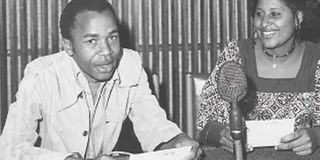End of a radio era as the curtains come down on ‘MDJ’ Eddy Fondo

Radio presenter ‘MDJ’ Edy Fondo (left) in the VOK studios with presenter Khadija Ali in 1976. Fondo died in Kilifi on April 11, 2017 in Kilifi. Below: Eddy Fondo hosting his radio show. PHOTO | CORRESPONDENT
What you need to know:
- Edward Fondo was born on April 8, 1952 in Kaloleni, Giriama, Kilifi County. Among his childhood playmates were Teddy and Billy Kalanda Harrison, the brothers who in later years formed one of the country’s most popular bands, Them Mushrooms.
- He moved to Nairobi in August 1972 with an ambition to become a broadcaster. As luck would have it, a friend introduced him to James Kangwana, who at the time was the Director of Broadcasting at the Ministry of Information and Broadcasting.
- Fondo is best remembered for the hugely popular Chaguo Lako a program where listeners wrote and requested their favourite songs giving reasons for their choice of music. The program was broadcast every Friday afternoon from 1974 until Fondo’s retirement from KBC in 2001.
The death this week of “MDJ” Eddy Fondo, one of the most popular voices in the history of radio in Kenya, marks the end of a golden era of broadcasting in the country.
His Chaguo Lako programme was one of the highest rated radio shows throughout the 1980s. Fans around the country and East Africa tuned in every Friday afternoon to hear Fondo’s signature on-air slogan: ‘rrrrrrrrright!”
Fondo, who had been ill for the last two weeks, died on arrival at the Kilifi County Hospital on Tuesday morning, just three days after his 65th birthday. He had been referred there after receiving treatment for several days at Mariakani Hospital.
Edward Fondo was born on April 8, 1952 in Kaloleni, Giriama, Kilifi County. Among his childhood playmates were Teddy and Billy Kalanda Harrison, the brothers who in later years formed one of the country’s most popular bands, Them Mushrooms.
“We attended school in Mombasa but would return to Kaloleni during the holidays and Fondo and his cousins were our best friends,” recalls Teddy. After completing his secondary education at Ribe Boys High School in 1971, Fondo worked as an untrained teacher at various primary schools in Bahari constituency of Kilifi for a year.
He moved to Nairobi in August 1972 with an ambition to become a broadcaster. As luck would have it, a friend introduced him to James Kangwana, who at the time was the Director of Broadcasting at the Ministry of Information and Broadcasting.
It was through Kangwana that Fondo got an opportunity to join the Voice of Kenya (later, KBC) as a trainee presenter in 1972. He learned the trade at the hands of renowned Kiswahili broadcasters like Elizabeth Obege, Leonard Mambo Mbotela and his idol, Job Isaac Mwamto.

Radio presenter ‘MDJ’ Edy Fondo in KBC studios. PHOTO | CORRESPONDENT
PROMOTING LOCAL MUSIC
Fondo’s first show was a greetings program called Salaams za Makundi in 1973 and it is during this time that he acquired his on-air moniker, M.D.J. (Makundi Disc Jockey). The format of the show was based on “salaams” where fans formed clubs and exchanged greetings through the radio.
In 1974, Fondo, together with fellow presenters Kazungu ‘KK’ Katana and Khadija ‘Dada Mrembo’ Ali started VOK Club, a program that drew membership from listeners across East Africa. “We formed a very lively trio,” says Kazungu, who also hails from Kaloleni, Giriama.
When Kazungu left V.O.K. to join the US Embassy in 1978, Fondo took over his show Wajue Wanamuziki. He interviewed Kenyan bands like Maroon Commandos and regional giants like Sam Mangwana, Marijani Rajab, Mbaraka Mwinshehe and Simba Wanyika, who celebrated him in the song 'Nisaidie Baba'.
“Fondo was a big promoter of benga music and he played artists like Collela Mazee on national radio,” says Kazungu.
Fondo is best remembered for the hugely popular Chaguo Lako a program where listeners wrote and requested their favourite songs giving reasons for their choice of music. The program was broadcast every Friday afternoon from 1974 until Fondo’s retirement from KBC in 2001.
Fondo was a national celebrity and he took his shows on the road to major towns like Nyeri, Mombasa, Kisumu, Kakamega, and Nakuru. So big was his influence that there was an outcry among fans when he was transferred by KBC to Mombasa in the 1980s. “He eventually returned to Nairobi and went back to his show saying ‘this is the original Chaguo Lako,’” recalls veteran newsreader Ngulamu Mwaviro.
Eddy Fondo was named Best Radio DJ in a national survey of readers carried out by the Daily Nation newspaper in 1984. After his retirement, Fondo relocated to his farm in Kaloleni.
Mwaviro says that away from the microphone Fondo was very quiet but his radio personality was larger than life.
Kazungu Katana, who knew Fondo for more than 40 years agrees: “He confined himself to work but once he left the office, Fondo loved and enjoyed his life.”
*****
(This profile of Eddy Fondo appears in the upcoming publication “Shades of Benga: The Story of Popular Music in Kenya” by Ketebul Music)




